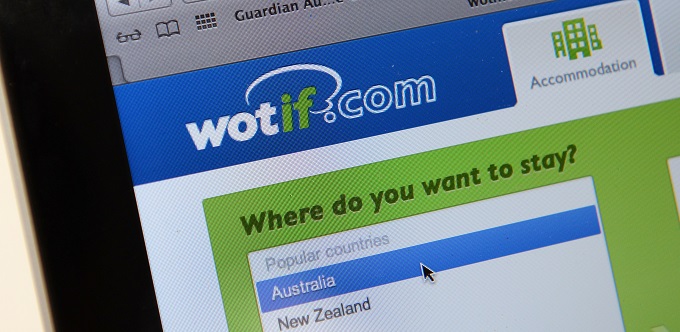
(AAP Image/Dan Peled)
Travel giant Expedia has bowed to industry pressure and waived contract clauses which prevented independent motel and hotel owners from undercutting their listings through their own channels.
However, the platform has indicated it will punish hotel operators who take advantage of the changes by ranking them lower on its searches.
The US-based multi-national confirmed it will be axing so-called pay parity clauses or narrow rate most favoured nation clauses (MFNs) on Friday, just weeks after Labor announced it would outlaw them if elected.
Pay parity clauses prevent independent accommodation businesses who ink deals with online travel agents (OTAs) like Expedia from advertising cheaper prices on their own websites.
Providers have long complained the clauses stymie competition and make it harder to run their businesses because of commission fees they incur through the platforms.
But in confirming the decision on Friday, an Expedia spokesperson said those who begin offering cheaper deals may pay a price.
“Australian hotels have the right and ability to offer higher prices to consumers who find them via Expedia sites,” the spokesperson said.
“This means a hotel offering relatively poor deals to consumers who are used to shopping and booking on Expedia sites will not be as relevant to consumers as its competitor hotels offering their best deals.”
“That hotel may find itself ranked below its competitors, just as it would if it had worse reviews or fewer high-quality pictures of its property compared to its competitors.”
Expedia, which also owns Wotif and Stayz, controls 80% of the online travel booking market alongside its competitor Booking.com.
The prevalence of the platforms, including their dominance of online search results, means many business owners feel they have to be listed in order to generate new business.
Operators SmartCompany has spoken to have said they get as much as 60 – 80% of their business through online platforms these days.
Being “darkened” by the search algorithms that guide the platforms can thus have disastrous consequences.
Industry bodies concerned
Accommodation Association of Australia chief executive Richard Munro welcomed Expedia’s decision but said he was concerned Expedia will punish partners who take advantage.
”The AAoA will keep a watching brief that property rankings will not be impacted by complex Expedia algorithms to darken properties due to rates being advertised under Expedia,” he said.
Munro said the algorithms Expedia uses aren’t transparent though, which makes understanding the problem difficult.
SmartCompany has previously spoken to Expedia clients who have claimed they’ve been de-prioritised by the platform for paying a lower commission on bookings or not complying with pay parity clauses.
Providers pay commissions as high as 30% on bookings through OTAs, which because of pay parity clauses has resulted in customers getting cheaper deals by ringing up or going in person.
Shadow Assistant Treasurer Andrew Leigh earlier this month promised Labor would crack down on the clauses if elected and on Friday welcomed Expedia’s decision.
He said in a later statement he’d hope the ACCC would investigate any attempt by Expedia to implement de facto price parity.
“Many would be deeply disappointed if it turned out that the platform was in fact implementing them in a surreptitious manner, such as by downgrading accommodation providers who offer a better deal on their own website,” he tells SmartCompany.
“The only thing that should matter to Expedia is how a hotel’s offering compares to those of other hotels. If Expedia does try to implement de facto price parity clauses, we would hope that the ACCC would investigate.”
Leigh previously said Expedia and Booking.com were “gouging” local hotel owners.
Expedia said it still believed in a business model where providers put their best price on its platform.
“We still believe that providing their best prices, content, amenities and general hospitality to Expedia’s consumers has always been and will remain the most effective way for Australian hotels to delight consumer,” the spokesperson said.
“This consumer-centric approach is fundamental to our business and will continue to be a key focus for us and we hope that Australian hotels will recognize that consumers who find them via Expedia sites are still their customers and deserve to be treated as well as any other customer.”
Other issues persist
Regulators in other markets, including France and Italy, have already cracked down on the clauses in recent years as global concern about the business practices of online travel agents has grown.
The ACCC has been investigating the use of pay parity clauses for some time.
However, hotel and motel owners say pay parity is only part of the problem restricting competition.
Using Google Adwords and heavy investment in search-engine-optimisation, online travel agents have pushed independent operators out of trafficked search engine placements.
In some cases, this has resulted in a direct search for a particular hotel or motel returning results for Booking.com or Expedia listings ahead of the businesses’ website, which sometimes doesn’t even appear on the first page.
Booking.com did not respond to a request for comment.
This story was updated at 3:36PM AEDT March 25.


COMMENTS
SmartCompany is committed to hosting lively discussions. Help us keep the conversation useful, interesting and welcoming. We aim to publish comments quickly in the interest of promoting robust conversation, but we’re a small team and we deploy filters to protect against legal risk. Occasionally your comment may be held up while it is being reviewed, but we’re working as fast as we can to keep the conversation rolling.
The SmartCompany comment section is members-only content. Please subscribe to leave a comment.
The SmartCompany comment section is members-only content. Please login to leave a comment.